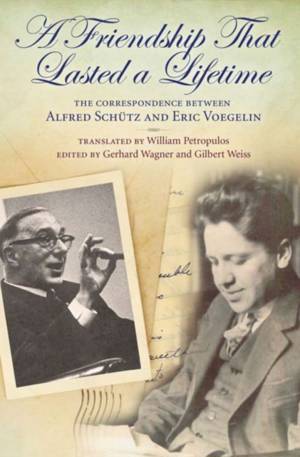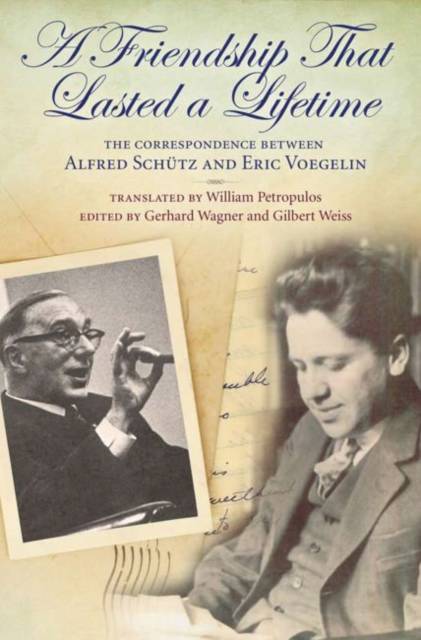
- Retrait gratuit dans votre magasin Club
- 7.000.000 titres dans notre catalogue
- Payer en toute sécurité
- Toujours un magasin près de chez vous
- Retrait gratuit dans votre magasin Club
- 7.000.0000 titres dans notre catalogue
- Payer en toute sécurité
- Toujours un magasin près de chez vous
A Friendship That Lasted a Lifetime
The Correspondence Between Alfred Schutz and Eric Voegelin Volume 1
80,95 €
+ 161 points
Description
Scholarly correspondence can be as insightful as scholarly work itself, as it often documents the motivating forces of its writers' intellectual ideas while illuminating their lives more clearly. The more complex the authors' scholarly works and the more troubled the eras in which they lived, the more substantial, and potentially fascinating, their correspondence. This is especially true of the letters between Alfred Schutz (1899-1959) and Eric Voegelin (1901-1985). The scholars lived in incredibly dramatic times and produced profound, complex works that continue to confound academics. The communication between these two giants of the social sciences, as they sent their thoughts to one another, was crucial to the work of both men. A Friendship That Lasted a Lifetime: The Correspondence between Alfred Schutz and Eric Voegelin demonstrates that Schutz and Voegelin shared a remarkable friendship: they first met as students in Vienna in the 1920s and found themselves great partners in discussion; years later they were pushed out of Europe by Nazi pressure and went to work at separate American universities. For twenty years they wrote each other, developing their respective scientific works in that dialogue. The letters bear witness to their friendship during the years they spent in exile in the United States, and they document the men's tentative attempts at formulating the theories of "lifeworld" and "gnosis" associated with Schutz and Voegelin today. The entire collection of 238 letters was printed in German in 2004, but this edited volume is the first to present their correspondence in English and offers a selection of the most important letters--those that contributed to the thinkers' theoretical discussions and served as background to their most significant thoughts. Editors Gerhard Wagner and Gilbert Weiss do not analyze Schutz's and Voegelin's works in light of the correspondence--rather, they present the collection to create a framework for new interpretations. A Friendship That Lasted a Lifetime takes a unique look at two major social scientists. This volume is a valuable resource in the study of Voegelin's political philosophy and Alfred Schutz's contribution to American sociology and marks an important addition to the literature on these remarkable men. Showing how scholarly discourse and the dialogue of everyday life can shed light on one another, the book finally presents this correspondence for an American audience and is not to be missed by scholars of philosophy and sociology.
Spécifications
Parties prenantes
- Traducteur(s):
- Editeur:
Contenu
- Nombre de pages :
- 256
- Langue:
- Anglais
- Collection :
Caractéristiques
- EAN:
- 9780826219114
- Date de parution :
- 21-02-11
- Format:
- Livre relié
- Format numérique:
- Ongenaaid / garenloos gebonden
- Dimensions :
- 157 mm x 236 mm
- Poids :
- 539 g

Les avis
Nous publions uniquement les avis qui respectent les conditions requises. Consultez nos conditions pour les avis.





